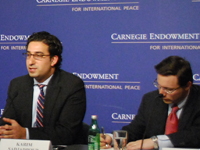Registration
You will receive an email confirming your registration.
Despite Iran's vast energy reserves, widespread economic malaise has been the greatest source of popular discontent in the Islamic Republic. George Washington University’s Hossein Askari, PFC Energy’s Fareed Mohamedi, the Washington Institute for Near East Policy’s Matthew Levitt, and Johns Hopkins University’s Kevan Harris discussed the overall health of the Iranian economy, the state of its energy infrastructure, and the likely impact of the major economic reforms. Carnegie’s Karim Sadjadpour moderated.
The State of the Iranian Economy
Harris and Askari discussed the state of the Iranian economy, focusing on the predicaments faced by average Iranians. Askari offered an examination of the problems Iran’s economy needs to overcome:
- Public Sector: After the Islamic Revolution, the oil industry was nationalized. Now, 65-70 percent of the Iranian economy is controlled by the government.
- Subsidies: After the war with Iraq, the government undertook a costly subsidy program. These subsidies total 18-30 percent of the Iranian GDP.
- Inflation: Inflation is very high in Iran, and shows no sign of falling. The Iranian Rial is highly overvalued.
- Unemployment: Iran also suffers from high unemployment and a rising income disparity.
Harris offered a slightly more positive perspective, based on a year of on-the-ground research in Iran:
- Private Sector: Iran has a reasonably strong private sector, Harris argued, but its large informal sector, that is neither taxed nor monitored by the government, is stronger. It is believed that as much as 30-40 percent of the Iranian population participates in this shadow economy.
- Youthful Population: The youth bulge is ending, and fewer young people are entering an already stretched labor market. This will probably lead to higher per capita income, as the labor market absorbs a higher percentage of workers.
- Freer Market: Ahmedinejad is probably the most free market laissez-faire president since the revolution.
An Oil Economy
Mohamedi described some of the significant problems Iran faces as an oil economy:
- Competition: Within a few years, Iraq will be producing 5-6 million barrels per day. Baghdad is aiming for parity with Saudi production levels rather than Iranian ones, threatening Iran’s share of the oil market.
- An Aging Sector: The oil sector in Iran is aging, suffering from underinvestment and facing significant management problems.
- Depleting Reserves: According to Mohamedi, much of Iran’s reserves have already been depleted.
- Demand: India and China have already started to cut back on oil purchases from Iran by about 20-25 percent.
Mohamedi concluded by pointing out some of the factors inhibiting Iran from having a strong gas sector. He said that while the gas sector in Iran is the second largest in the world, demand currently exceeds Iran’s production capabilities due to the costs of imports, competition from other markets, infrastructure issues, and sanctions which impede the development of a liquefied natural gas sector.
Economic Sanctions
Levitt discussed the sanctions against Iran, arguing that those who claim that sanctions have failed are not seeing the big picture:
- Targeted Measures: He described the sanctions as targeted financial measures related to proliferation and terrorism activities, rather than wide scale sanctions. These targeted sanctions are aimed at disrupting Iran’s ability to access and ship nuclear materials and at constricting their operating environment.
- Front Companies: The United States is also prosecuting people and companies that serve as a front for Iran.
- The Revolutionary Guard: The Iranian Revolutionary Guard is most targeted by the sanctions, but is also best placed to evade sanctions.
- Levels of Sanctions: The international community is employing different levels of sanctions: formal, regional, multilateral, unilateral, and informal, which has succeeded in encouraging a wide range of businesses to pull out of Iran.
